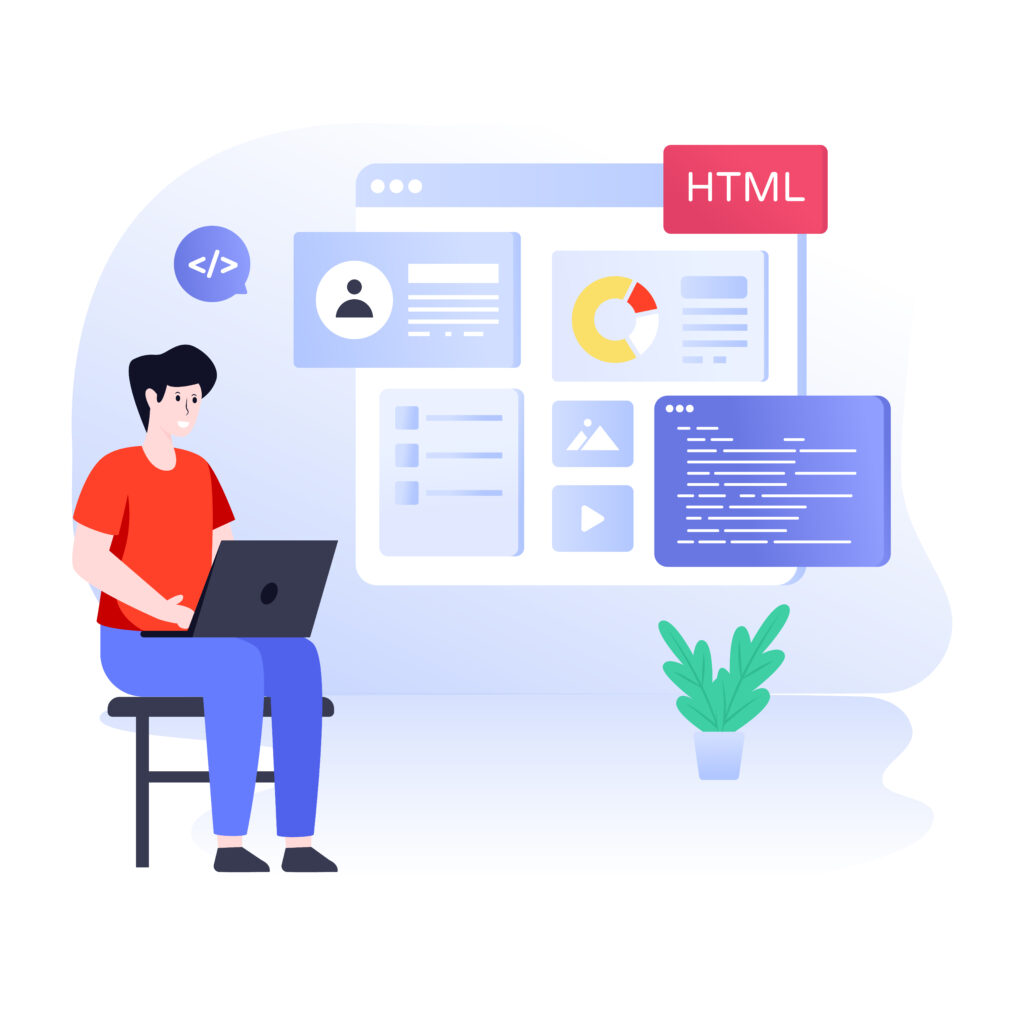The ever-expanding digital world relies on the magic touch of website developers. These skilled individuals are the architects behind the websites and web applications we use every day. But what exactly does a website developer do, and how can you join this dynamic and in-demand field? Let’s find out with Levinci!
What is a Website developer?
A website developer is a programmer who specializes in creating websites and web applications. They use their knowledge of coding languages and web technologies to bring websites to life, ensuring they function properly and deliver a good user experience.
What does a Website Developer do?
Website developers do not just stop at coding and design but also go deep into the process of creating the best online experiences for users. Here are the main tasks of a Website Developer:
- Build each part of the website from start to finish: They use programming languages like HTML, CSS, and JavaScript to create interactive and engaging websites.
- User Interface Design: They apply their knowledge of interface design to create enjoyable and friendly user experiences. From the layout, the use of colors and images, as well as other elements are all taken care of to create an intuitive and attractive interface.
- Website Developer integrates interactive elements such as forms, buttons, and other functions to create a complete experience. They work with back-end data and APIs to display and update information on the website.
- Make website performance improvements by optimizing source code, images, and data. This helps the website load faster and provides a better experience for users.
- Regular updates and maintenance to ensure that the website remains functional and secure from changes in the online environment.
- Interact with the design team to ensure that the user interface and overall design of the website work in a harmonious and attractive manner.
- Continuously updated with the latest technology trends to apply to work and improve user experience.
3 common types of Website developers
Front-End Developer

Often referred to as the “client-side” developer, the front-end developer is the architect of a website’s user experience. They’re responsible for everything users see and interact with on a webpage.
Here’s what they typically handle:
- Using HTML and CSS, they translate design mockups into functional web interfaces, ensuring a visually appealing and user-friendly layout.
- Implement JavaScript and various frameworks to create dynamic elements and user interactions, like animations, form submissions, and responsiveness.
- Ensure the website displays and functions flawlessly across different devices, from desktops to tablets and smartphones.
- Prioritize web accessibility standards to make the website usable for everyone, regardless of ability.
Back-End Developer

Working on the “server-side,” the back-end developer handles the unseen but crucial functionalities that power a website.
Here’s what they typically handle:
- Write the core logic that dictates how the website functions and interacts with data by using programming languages like Python, Java, or PHP,…
- Manage databases that store website information like user accounts, product details, and content. They ensure data is stored securely and retrieved efficiently.
- Maintain the server that runs the website, ensuring smooth operation and addressing any technical issues.
- Implement security measures to protect the website from cyberattacks and data breaches.
Full-stack developers
These are the “jacks-of-all-trades” in the website development world. They possess expertise in both front-end and back-end development, allowing them to work on all aspects of building a website.

Full-stack developers can:
- Understand how both front-end and back-end aspects work together, ensuring seamless integration and communication between the two sides.
- Handle all stages of development, from designing the user interface to writing server-side code, making them highly adaptable and efficient.
How to Become a Website developer?
The path to becoming a website developer can be flexible and cater to different learning styles and preferences. Here’s a breakdown of some common routes you can take:
Educational background
College Degree: A bachelor’s degree in computer science, web development, or a related field can provide a strong foundation in programming languages, web technologies, and software development principles. This can be a valuable asset, especially for landing entry-level positions at larger companies.
Associate’s Degree: An associate’s degree in web development or a similar field can offer a more focused curriculum in a shorter timeframe compared to a bachelor’s degree. This can be a quicker way to gain the necessary skills and enter the workforce.
Choose development expertise
As you continue to develop your skills, you will need to choose an area of specialization. But what types of web development are there? All website developers are classified into three main categories:
- Front-End developers work on the “client side” of web development, focusing on the look and feel of a website, ensuring an aesthetically pleasing and user-friendly experience. It is ideal for those who enjoy the visual aspects of web development and creating user interfaces.
- Back-End Developer will deal with the server-side logic that powers a website, ensuring smooth functionality and data management. That is, focusing on how a website works and includes databases, servers, networks and hosting, etc. It is a good fit if you have a logical mind and enjoy problem-solving and working behind the scenes.
- A Full-Stack developer requires expertise in both front-end and back-end technologies. It is the path for those who want a broader skill set and the ability to handle all aspects of website development, from front-end to back-end.
Build technical skills
Technical skills equip you with the knowledge and tools to translate ideas into functioning websites. Without a strong foundation in programming languages, frameworks, and other technical aspects, it’s difficult to bring websites to life.
- HTML: The foundational markup language for creating the structure and content of webpages.
- CSS: Responsible for the visual design and styling of websites, controlling elements like layout, fonts, colors, and animations.
- JavaScript: Adds interactivity and dynamic behavior to webpages, allowing for features like user input, form validation, and animations.
- Server-Side Programming Languages: Languages like Python, Java, or PHP are used to create the core logic of a website, handling tasks like data processing, server communication, and interacting with databases.
- Databases: Websites often rely on databases to store information like user accounts, product details, and content. Familiarity with SQL (Structured Query Language), a common language for interacting with relational databases, is valuable.
- Technical SEO: Many website design elements can affect a website’s search engine rankings. Understanding how search engines rank websites is very useful in a developer’s job.
- Version control: This allows you to track and control changes to the source code without having to start from scratch every time something goes wrong.
- Visual design: Understanding basic design principles, such as how to use white space, choose fonts, and incorporate images, can enhance your marketing.
Build a web development job portfolio
A portfolio is your chance to shine and demonstrate your technical abilities as a website developer. It goes beyond a resume by visually showcasing real-world projects you’ve built. This allows potential employers to see your proficiency in various programming languages, frameworks, and design principles.
Get certified
Earning a certification can validate your skills to potential employers. You’ll find many generic and carrier-specific options, including: ACE (Adobe Certified Expert), MCSD (Microsoft Certified Solutions Associate), AWS (Amazon Web Services), etc.
Conclusion
In summary, a website developer is a skilled professional who brings together design, technology, and functionality to create effective and engaging web experiences. Their work is critical in building the digital infrastructure that supports modern communication, commerce, and connectivity.

